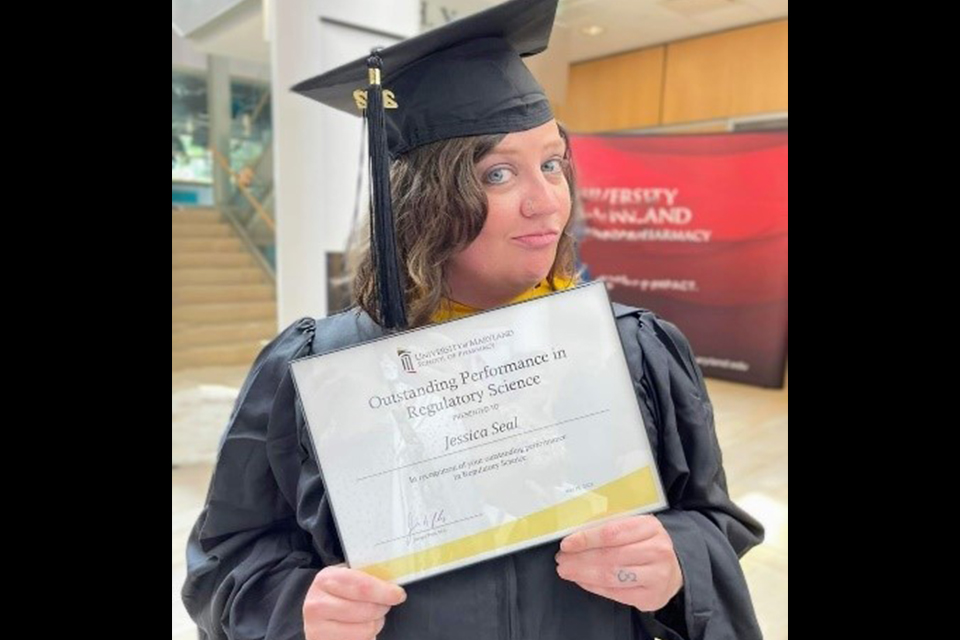My UMSOP Story: Jessi Seal, MS ’22, quality assurance and validation engineer, AstraZeneca
Jessi Seal, MS ’22, is an alumnus of the MS in Regulatory Science program. She earned her undergraduate degree in biology from Shepherd University in 2012. She is a quality assurance and validation engineer at AstraZeneca.
What has been your career path up to now?
Upon graduation from Shepherd University with my degree in biology in 2012, I was an American Sign Language interpreter until I started working at Trans Ova Genetics as a sexed semen manager. In 2014, I started at AstraZeneca in Frederick, Md., as a senior sample management coordinator, which allowed me to learn a lot about quality control and the manufacturing process. I transitioned to lead associate of facility and engineering site operations, which gave me exposure to regulatory audits and an understanding of the facility and engineering aspects required for a biopharmaceutical manufacturing facility. Upon graduation from the MS in Regulatory Science program, I became a quality assurance validation engineer. This position allows me to use both my previous experience and master’s degree from UMSOP to ensure that AstraZeneca continues to be a leader in the pharmaceutical industry.
What interested you in learning more about regulatory science? What was your prior exposure to these topics?
Throughout my different roles at AstraZeneca, I was exposed to the audit process and had gained a wide range of skills and knowledge in quality control, manufacturing, facility and engineering, and quality assurance. I wanted to get a degree in regulatory science because it’s the best place to make an impact. Regulatory professionals have a responsibility to ensure that drugs are effective and safe for their targeted patients. It’s a challenging field of work but also extremely rewarding and gratifying.
What drew you to attend the University of Maryland School of Pharmacy?
I made the decision to earn my master’s during the COVID-19 pandemic in 2020. I wanted to study in a fully online program because everything was so unstable. My time management skills improved greatly through the online regulatory science program at UMSOP. As a working professional, wife, softball player, volunteer, and, at the time, a full-time student, the online course work and recorded active learning sessions allowed me to fit all my activities into my “work-school-life” balance. It also also required me to be engaged with what we were learning because it wasn’t as simple as showing up to class at a required time.
What was your experience like in the MS in Regulatory Science program?
I had an amazing experience. I liked the personalized education and the flexibility in topics. Students could create presentations and/or write about topics that aligned with professional interests and goals. Additionally, the variety of the courses from pre-clinical to post-approval were extremely important to me. This truly will help us as regulatory professionals in the biopharma industry have a much broader understanding of the different steps required to release safe and effective medications to patients.
What were some of the highlights of the program? What were your interactions been like with faculty, staff, and students?
I have to say my group kept me sane during the process. There was a sense of comradery among all of us because we were all going through something together, and we were dependent on each other. We all kept each other accountable, which helped us meet deadlines. My team was very forward thinking so we planned our group projects on weeks that individual projects weren’t due to help maintain a balance.
I also appreciated that all the professors enjoyed teaching their subject. They were so knowledgeable and engaging, which helped me stay encouraged throughout the process.
James Polli, PhD, the Ralph F. Shangraw/Noxell Endowed Chair in Industrial Pharmacy and Pharmaceutics and director of the MS in Regulatory Science program, was so helpful and flexible. He truly understood that the majority of us had other things going on in life, especially during a pandemic, which helped me not become frustrated when things felt like they were piling up. He was always quick to answer any questions that my team had and was willing to have discussions when you needed advice.
How did the program help you to advance your career?
Upon graduation, I was promoted to technical operations lead, which requires leadership skills and subject-matter expert knowledge of the business processes. I believe working towards and obtaining my degree made upper management take notice of the personal improvements I was making and how that was also improving my skills at work.
Shortly afterwards, an opportunity arose to change departments and transfer from facility and engineering to quality assurance and validation. In my current role in quality assurance, I am getting firsthand experience with developing and approving new drugs, validation of new systems, equipment and processes, risk management, and so much more. This role will directly help me become more involved with regulatory science areas and move forward with my career goals.
What is your advice to prospective students who might be considering whether to apply to this program?
Don’t pick this program if you want an “easy” degree. Pick this program if you truly want to become a well-rounded regulatory affairs professional. Pick this program because you want to make sure that foods, drugs, and medical products are safe and effective. Pick this program because you are willing to make tough decisions. Pick this program if you want to have a positive influence on public health. Pick this program because you want to make a difference.
About the MS in Regulatory Science program: The MS in Regulatory Science program addresses all major areas of drug product regulatory science, including chemistry, manufacturing, and controls (CMC); clinical research; and post-approval surveillance, as well as drug discovery. Learn more and apply today.

